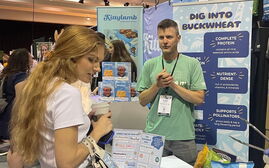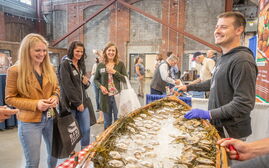
Processing Your Payment
Please do not leave this page until complete. This can take a few moments.
Maine Grains is creating a food-centered gathering place in downtown Skowhegan
 Photo / Fred Field
Amber Lambke, co-founder and CEO of Skowhegan-based Maine Grains, plans an expansion next door that will include dedicated year-round space for the Skowhegan Farmers’ Market.
Photo / Fred Field
Amber Lambke, co-founder and CEO of Skowhegan-based Maine Grains, plans an expansion next door that will include dedicated year-round space for the Skowhegan Farmers’ Market.
The Maine Grains building — situated in the heart of Skowhegan in the old 14,000-square-foot former Somerset County prison — has in recent years become something of a business hub.
The ground floor has the cafe Miller’s Table at Maine Grains, with a wood-burning pizza oven, seating and display cases filled with brownies, loaves of bread and cookies. There is a Maine Grains retail store, with cookbooks, cooking utensils and memorabilia. Also on the ground floor, artisan cheesemaker Crooked Face Creamery has a cheesemaking operation and retail storefront.
In the upper floors, there’s a radio station and a vast collection of cookbooks. A related business, Canaan-based Good Crust, makes pizza dough from Maine Grains flour. And of course the building houses the grist mill that processes and packages the grains.
The person behind Maine Grains is CEO Amber Lambke, who has also been a catalyst for related startups. (Her twin sister, Heather Kerner, is the owner of the Good Crust.)
To source organic and heritage grains, Maine Grains works with 20 distributors and 45 farmers. Maine Grains, co-founded in 2012 by Lambke and Michael Scholz, serves bakers, brewers, chefs and consumers with fresh-milled, organic and heritage grains sourced from Maine farmers.

The business was launched with a focus on helping to revitalize the local economy and to help connect farmers, millers and bakers. Lambke said, while you could buy local produce, meats and cheeses, there weren’t any local grain options.
“I was volunteering at our local farmers’ market when I realized that local grains were missing from the conversations,” says Lambke.
“Farmers were growing ‘cover crops’ like rye and oats but didn’t see much of a market for them,” she adds. “There were no food-grade markets for these crops. We needed machinery to take out the weed seeds; quality was a problem.
"We saw the food movement changing things. Farmers’ markets have rules that you must produce or grow the food locally, yet bakers were allowed to sell bread [without locally sourced grain]. There was an awakening among the food movement.”
Today, Maine Grains has around 20 employees and annual revenue of $2.3 million.
Maine Grains and Lambke have been key drivers in the growth of Skowhegan, population 8,603, which is undergoing changes in its downtown and on the Kennebec River waterfront.
The proposed farmers’ market
Lambke is about to launch what may be her biggest undertaking yet, developing an adjacent lot that will allow for expanded Maine Grains operations.
Lambke proposes to construct a building on the empty lot next door that could house the Skowhegan Farmers’ Market; Maine Grains administrative offices; space to blend and package grains for value-added products; online order fulfillment; and rental space for entrepreneurs.
It would also have an expanded dry goods shop with a demonstration area and a large social hall to accommodate the winter farmers’ market and community gatherings.
Maine Grains acquired the vacant lot in 2020 under an agreement with the town to use it in mutually beneficial ways.
Lambke said that the town would like to see a project that fits in with the Maine Grains campus, which has inspired a lot of entrepreneurship, including food and agriculture entrepreneurship.
The project also encourages foot traffic and retail shopping in the downtown area as part of a larger design toward a river park development that is underway on the Kennebec.
Building community
Amy Rowbottom, owner of Crooked Face Creamery, started her business at the farmers’ market and operated there before moving her operations to the Maine Grains building.
“The traffic for the farmers’ market helps us out when they are here and in the winter when they move up the street to the greenhouse, and we miss them,” says Rowbottom.
“It gets pretty quiet around here when the farmers’ market moves. I am excited to have that space for the farmers. We work so closely together that having them here year-round will be great.
“I hope the new building will bring more community and more collaboration. We all collaborate so much,” she continues. “We can have even more startup companies because I know that Amber is thinking about more business space for people to open up businesses. Making downtown Skowhegan an attraction for people to come, I think, is the biggest thing.”
Lambke says the Farmers’ Market plays an important role.
“We will save room in that building to solve a longstanding issue for the Skowhegan Farmers’ Market — which is what to do in the wintertime,” says Lambke. “In recent years, the Farmer’s Market has met weekly on our lot from April to November. But, for the winter months, they go up the street and into a greenhouse. We all feel the loss of the market during this time and you lose customers when you move it off-site.”
She says the Farmers’ Market plays a vital role in addressing food insecurity in the region.
“We serve a lot of SNAP users at our Farmers’ Market. Skowhegan is a population where 51% of our population qualifies for SNAP,” she says, referring to the federal Supplemental Nutrition Assistance Program. “We have a robust program of [SNAP electronic benefits transfer] sales at the Farmers’ Market as well as nutrition incentives.”
More about the project
In the past four years, the expansion project has gone through its challenges and is now in its third design phase, navigating the pandemic, inflation and increases in construction costs.
“For the version two building, we got a price quote back of $5 million to build,” says Lambke. “At the time, that was a little higher than we hoped, so we waited a year and tried to engineer some costs out of the design. COVID construction prices kept going up, so even by engineering out some of the most expensive pieces, the quote a year later came back at $7.5 million.
“We engaged our bank, got an appraisal loan on that building, and that $7.5 million building was going to be appraised at $2.5 million once it was built,” she continued. “In my 20 years of living here, the only new building I’ve seen go up in the downtown area besides box store chains is the pharmacy.”
She cites the region’s “chronic disinvestment” and investment in box stores or strip malls.
The gap between the estimated construction cost and the appraised value “is just enormous,” Lambke says. “You need to fill that gap some other way and that is philanthropic cash flow — and putting pressure on an expanding business with cash flow is difficult.”
Funding for the project
In 2022, the USDA awarded Lambke a $200,000 Healthy Food Financing Initiative grant. An anonymous donor also contributed money to help spur the project’s planning stages.
Lambke told Mainebiz that she is working on securing more funding this year. She has several grant requests out right now for multiple pieces of this vision.
“The Healthy Food Financing Initiative grant is helping us with all of the pre-construction engineering services, architecture, mechanical and geotechnical services that are necessary to get ready for the construction. We have just gone under contract with [Fairfield-based] Sheridan Construction to help us with design and development,” says Lambke.
“Those are the next steps while we continue to raise funds.”












0 Comments